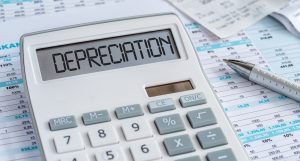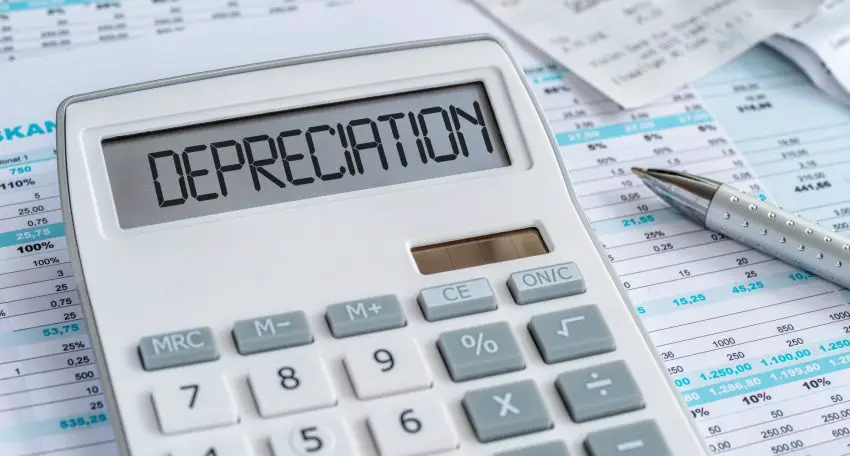Are you a Business Owner looking to lower your taxes? What has your company purchased in the past year? Do you know Major asset purchases can transform your company operations, but they have another benefit, too: they can lower your taxes. Lets Learn How you can use Section 179 Deduction to help lower taxes for your small business.
Curious? Below we’ll cover in detail how Section 179 Depreciation works and how you can use that to your benefit.

Contents
What Is Depreciation?
For your business accounting, depreciation refers to the value of your asset or Qualifying equipment each year that it is used. Companies that depreciate the value of equipment or an asset will report lower profits for that year and higher expenses due to the asset.
This will lower the taxes they have to pay. For this reason, paying higher amounts in depreciation can be beneficial to companies.
In order to claim depreciation form 4562 must be used for businesses.
What is Section 179 Deduction?
IRS (Internal Revenue Section) Section 179 Deduction allows Business Owners to deduct the full purchase price of certain equipment for the year it was placed in service.
If you deduct the full purchase price, it creates an initial expense deduction that is higher than the regular depreciation method. Therefore, the company faces a lower tax liability.
Companies can finance Qualifying equipment or pay for equipment in cash. But to take advantage of the accelerated deprecation deduction, there is one caveat. The tax code requires that the equipment be put into service before December 31 of the tax year.
If companies want to use Section 179, they need to plan ahead for receiving Qualifying equipment so they can place it into service before the deadline.
Section 179 Deduction allowances are very helpful for small and medium-sized companies. Many will get significant savings from using this method.
However, there are Dollar deduction limits for companies.
In 2022, the spending cap on equipment purchases is $2,700,000 to be eligible for Section 179. Companies have a deduction limit of $1,080,000.

What Is Eligible Section 179 Equipment?
We described that both Section 179 and bonus depreciation applies to eligible equipment(Tangible personal property). What is this equipment exactly?
Eligible equipment(Section 179 Property) includes heavy equipment, machinery and Business Vehicles(Trucks) that are used for Business Purposes.
It also includes computer equipment, off-the-shelf software, and some vehicles for business use. It’s a good idea to check with a tax advisor to double-check what is eligible.
Key note here: Equipment purchased can be financed as long as its used for business purposes and placed in service before the tax year, it qualify for section 179 deduction.
In the face of Covid-19, some modifications to business property and the use of sanitizing equipment could be eligible for the Section 179 deduction.
For Section 168k, Qualifying equipment that qualifies as a depreciable asset is eligible for bonus depreciation.
Note the Tax Cuts and Jobs Act (TCJA), high expanded the definition of “qualified real property”. It now includes improvements to nonresidential real estate like Security Systems, fire alarms and new roofs. This could then be applied to your business expenses.
IRS Section 179 for Vehicles
In order for a small business to claim Section 179 exemption for vehicles(Such as SUVs, Pickup Trucks, Vans), an automobile can have an annual cost of less than $500,000 and is taxable.
Those who spend less than 80% are excluded from Section 179 deductions. If you use your car at a profit level that exceeds 50% of your annual income you must calculate this deduction.
The IRS outlines the steps to multiply the property cost per unit of business use by the percentage of its usage. .
Thus, the property’s costs are deductible under Section 179. Generally, the owner calculates business use using mileage.
What Vehicles Qualify for Section 179?
It divides sections 179 vehicles into three categories: Car & Luxury vehicle & SUVs & road vehicle. Business vehicle must be used 50% of the time or more in order to take the deduction.
We have compiled a list of Vehicles along with the Gross Vehicle Weight Rating that can help you with selecting the right vehicle for your business.
You can look at these vehicles that are over 6,000 Pounds.
Section 179 deduction For Vehicles Example
Internal Revenue Code, Section 179 Deduction allows you to expense up(Take the Deduction) to $25,000 on Vehicles(One year) that are between 6000 Pounds and 14,000 Pounds or More in the year Vehicles are placed in service.
If you are looking to write off the entire purchase price of the vehicle, look into Bonus depreciation rules that were passed under TCJA.
We have more details below. To learn more about Section 179 See IRS Section 179 Details here
Section 179 in California
California has very specific rules pertaining to depreciation and limits any Section 179 to $25,000 Maximum per year. So for example, if you purchase a business van that cost$75,000,
you can write off $25, 000 as Section 179 in first year and remaining amount of $50,000 in this example has to be spread over 5 year period.
What Is Bonus Deprecation?
Bonus depreciation is another way that small business can minimize expenses. Section 168(k) includes provisions on bonus depreciation.
It allows for bonus depreciation (meaning 100% expensing) on certain equipment and property New or Used. Doing this creates accelerated depreciation and a lower tax burden, a similar result to using Section 179.
Companies can take both Section 179 and Bonus Depreciation allowances. However, companies must first take Section 179. Anything over the $1,080,000 limit can then be taken in bonus depreciation.
Note that companies must be profitable to take the Section 179 deduction. But with bonus depreciation, there is no business income limitation. You could take a net loss if you decide to take advantage of bonus depreciation.

Section 179 deduction Vs Bonus Depreciation
As a Business owner you know its important that you know the difference between Section 179 and bonus depreciation, you may be more curious about which one to use. Below we’ll touch on five key differences to know that will help you make this decision.
And remember, you can use both in the same year!
1. Deduction Limits
Section 179 has annual limits on deductions. For this year, that limit is $1,080,000. If your business spends more than the allowed $2,700,000 on business equipment, the amount you can deduct will start to decrease.
However, This depreciation isn’t limited to cost. This is a major difference between depreciation and IRS Section 179. You can deduct your entire investment using bonus depreciation, no matter how much you’re spending each year.
2. Flexibility
With Section 179 deduction, you can choose which assets you’ll deduct using this section. You can also decide which items to save for future tax breaks.
You can even split the deduction if you want. For instance, so you buy a new car for the business. You can claim half the cost of the car at purchase and then spread the rest of the purchase over a longer period of time.
Unlike the Section 179 deduction, bonus depreciation must cover. 100% of the asset’s cost. All assets must be in the same category. So, if you use depreciation for a five-year asset, you’ll have to apply it for all 5-year assets that you bought that year.
3. Business Income
Section 179 cannot be larger than your annual business income. Therefore you must be running a profit if you choose to use this method.
Meanwhile, you can use bonus depreciation and run a loss at the same time.
So, if you choose to use both Section 179 and bonus deprecation in the same year, you must be strategic. Section 179 gets applied first, so you’ll need to have a profit when you apply it.
4. Asset Coverage
Section 179 covers a host of assets. It includes real estate upgrades like adding a new roof. Bonus depreciation does not cover this category and only applies to new equipment.
5. Statutory End Date
The statutory end date is the date that the law is no longer in effect. The statutory end date for the 100 percent deduction for Bonus Depreciation is December 31st, 2022.
Then, it will decrease over the next few years: 80 percent in 2023, 60 percent in 2024, 40 percent in 2025, and 20 percent in 2026 if the law does not change. The law could be updated before 2023 to extend the policy.
Section 179 Deduction has no statutory end date, meaning that you can apply it indefinitely to your purchases.
Leveraging Your Depreciation Expense
Your depreciation expense can be a benefit for your company if you report it strategically. By using Section 179, bonus depreciation, or both, you can reduce your company’s tax burden.
Depreciation is a deduction which lets companies reduce the value and return of the property purchased.
It applies both to rent and for lease properties. Depreciation is generally spread over time. Consequently, owners can forget this deduction during an acquisition year.
Is Section 179 A Good Idea?
Unlike many other regulations, Section 179 allows small businesses to immediately expense the entire cost (Purchase Price) of fixed assets(such as office equipment) that are used for business purposes within the tax year.
Having Section 179 Deduction can help reduce taxes on small businesses. Most businesses have assets whose value devalues with the passage of time.
Key thing to remember here is you cannot excessively use these business assets for personal use. For example Business vehicles(SUVs) needs to be used for business and not for personal use such as picking up children. IRS is very strict when it comes down to auditing businesses that deduct vehicles over 6,000 pounds and use them for personal purpose.
We recommend talking to a tax professional and learning more about Maximum section 179 deduction and deduction limit.
IRS Section 179 Non Qualifying Property
Most business equipment and property will qualify for the Section 179 Deduction. We have compiled a list of the property and equipment that does not qualify for the Section 179 Deduction. See a Brief List Below:
- Real Estate sometimes called Real Property, does not qualify for the Section 179 Deduction. Real Property(Real Estate) is typically defined as Vacant Land, Occupied land, residential or commercial buildings, permanent structures and the components of the permanent structures (including leasehold improvements). Furthermore, Many other property types that would not qualify for the IRS Section 179 Deduction include paved parking(Gravel, Cement or Asphalt) areas and fences around the structures.
- If you have a Business Property that is used outside the United States generally does not qualify for the IRS Section 179 Deduction.
- Business Personal Property that is used to furnish Hotels, Bread and Breakfast and other lodging is generally not qualified for the IRS Section 179 Deduction.
- Business Property acquired by gift or inheritance(from Parents, grandparents or relatives) , as well as property purchased from related parties(such as brother, sister, father, mother) does not qualify for the Section 179 Deduction
- Finally, Any property that is not considered to be personal property per Internal Revenue Code may not qualify for the IRS Section 179 Deduction.
Is Section 179 going away?
From Monitoring Congress and Senate Discussions, it doesn’t seem like Section 179 deduction is going away anytime Soon.
As always, political environment is very unpredictable, so it can happen but the chances seems to be very low. IRS Tax Code is always evolving so you never know when a senator propose a new change that can either limit or emilite this valuable deduction.
The bottom line
Internal Revenue Service allows Section 179 deductions which is extremely useful for small business owners.
Machinery is expensive, and small businesses need to account for this tax advantage when purchasing products or services. However, these deductions may prove complex and numeric.
It is always good to consult an accountant, CPA or tax preparer before buying, and once again, before claiming the deduction for Section 179.
Section 179 Deduction Disclaimer
Always contact your tax professional to get more detailed information on Section 179 and the automobiles related Tax Code. The IRS Tax Code provides businesses with the ability to deduct the total purchases of qualified goods and software during the tax year.
If you are buying or leasing equipment, the price is deducted from your net income. This is an initiative by the government for the promotion of investment by US businesses in the purchase of products and services.






3 thoughts on “Understanding IRS Section 179 Deduction (Ultimate Guide)”